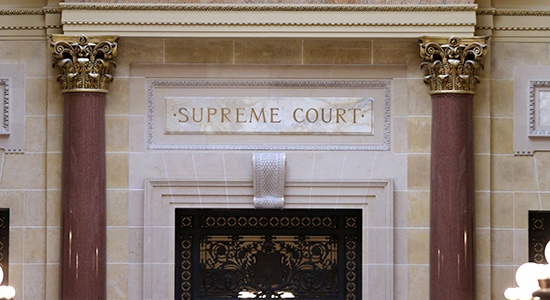
June 22, 2017 – The state supreme court will hold a public hearing on a petition requesting increased pay for court-appointed lawyers and a declaration of unreasonableness concerning rates paid to attorneys who take public defender cases.
At the court’s open rules conference yesterday, the last one of the term, the court unanimously voted to set a public hearing date, likely in December, and solicit comments related to petition 17-06, which would raise the per hour fee paid to court-appointed attorneys, under Supreme Court Rule (SCR) 81.02(1), from $70 to $100.
The petition also asks the court to declare, through SCR 81.02(2), that an hourly rate less than $100 for legal services rendered by private attorneys who take appointments from the State Public Defender, under Wis. Stat. § 977.08, is unreasonable.
Wisconsin’s current rate is the lowest indigent defense compensation rate in the country. Petitioners say this extremely inadequate rate is causing a constitutional crisis, because the Sixth Amendment demands that criminal defendants receive effective representation and financial conflicts put that constitutional mandate in jeopardy.
Petitioners hope a court declaration would clearly express the constitutional violations that occur in failing to increase the pay rate, which the legislature has not done since 1995 when it reduced the rate from $50 per hour to $40 ($25 for travel time). From 1978 to 1992, the pay rate was $35 per hour, $5 less than the current rate of $40.
The petitioners argue that the Wisconsin Supreme Court has the authority to act on this issue, as a co-equal branch of government charged with the authority to uphold provisions of the constitution and ensure the effective administration of justice in Wisconsin.
Justices Set a Public Hearing
A number of justices appeared to agree that the $40 per hour rate, which has remained largely unchanged since 1978, is too low. But some justices questioned the court’s authority to make constitutional declarations through a rule change petition.
“The compensation rate is, frankly, shocking,” said Justice Daniel Kelly. “It needs to increase substantially. However, I do want to make sure that we do it in the correct way.
“Our authority to address the constitution comes to us generally by cases. Whether we can make a constitutional proclamation as a consequence of a petition, well that I don’t know. … Do we handle the petition like an original action in terms of fact-finding?”
 Joe Forward, Saint Louis Univ. School of Law 2010, is a legal writer for the State Bar of Wisconsin, Madison. He can be reached by email or by phone at (608) 250-6161.
Joe Forward, Saint Louis Univ. School of Law 2010, is a legal writer for the State Bar of Wisconsin, Madison. He can be reached by email or by phone at (608) 250-6161.
Justice Shirley Abrahamson said in this area of compensation, both the legislature and the judiciary can act, so long as the legislature does not interfere with the primary function of the court, which includes ensuring the constitutional rights of defendants.
Justice Annette Ziegler said invoking shared legislative-judicial authority is not so simple since SPD appointment compensation rates are set by the legislature.
“I think we can all agree that $40 is much too low, there’s no question about that. The issue is, is it within our province to act. That’s the sticking point,” said Ziegler.
Through a public hearing, the court will likely ask petitioners and other proponents and/or opponents to address the issue of legislative versus judicial authority, and the court’s authority to make constitutional declarations through the rule-making process.
Court Will Schedule Hearing on Dues Petition
The court voted to hold a public hearing, likely in December, on a petition (17-04) that would require the State Bar of Wisconsin to create two budgets, one funded with mandatory member dues and another funded with voluntary member dues.
Madison attorney Steven Levine argues that mandatory dues should only fund the costs of regulatory programs, including: preparing and participating in rulemaking proceedings before the Wisconsin Supreme Court; administering the fund for client protection; administering the Wisconsin Lawyer Assistance Program (WisLAP); the ethics program; and other regulatory programs that the supreme court may approve after a hearing.
Levine argues that all other State Bar programs and services not related to these specific regulatory programs should be funded with a voluntary dues budget.
Other Business
- The court approved changes to rules that govern education requirements for municipal judges to clarify that the municipal judge orientation and four-credit requirements apply according to the calendar year and apply to appointed judges, in addition to elected judges.
- The court will, as required, set a public hearing on a Judicial Council petition (17-05) which addresses perceived ambiguity in the appellate rules that relate to size, number, and timing of briefs that may be filed in multi-party cases.
- Finally, the court voted (5-2) to end its practice of holding rules conferences open to the public. Starting next term, conferences on rule-making will be closed.
